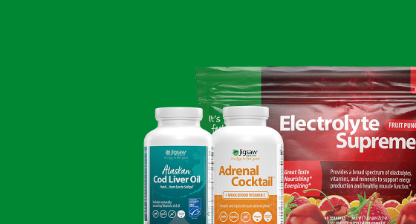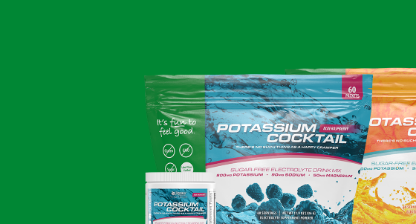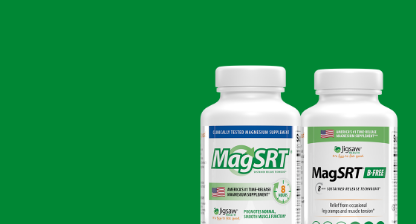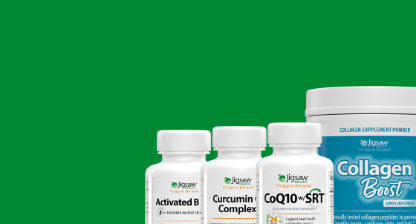As relaxing and soothing as Epsom Salt baths are, what does science have to say? Thomas DeLauer (aka. Mr. Mineral) digs in and discusses what recent studies suggest might really be happening to your body during an Epsom Salt Bath.
There's an easier way to absorb and replenish your Magnesium stores: Jigsaw Mag w/SRT®
(PS - It saves a lot of bath water too... and we like to Recycle) ;-)
Transcript by Rev.com
- Don't be the weirdo that drinks your bath water. Seriously you don't need to. In this video I want to explain something about Epsom salt baths. I wanna talk about if you can take an Epsom salt bath and actually absorb magnesium through your skin, it's pretty interesting stuff.
But first and foremost we have to remember that Epsom salt is not really a salt.
It's actually magnesium sulfate.
What that means is it's Magnesium, Sulfate and water molecules all together. But what we really want to determine is can that magnesium sulfate pass through your skin get into your bloodstream and potentially replenish depleted or deprived magnesium stores.
I'm gonna reference some studies that'll lead us in some pretty powerful directions although nothing is truly conclusive.
- Okay, the first thing I wanna look at is a study that was done in vitro. Okay, this study was done in a petri dish. That's what in vitro means.
It means that it wasn't done in an actual live trial it was done in a lab. However, still lots of good science that can come from that.
What this study looked at was if anions and cations can pass through skin molecules or skin tissue to actually potentially allow the absorption of nutrients. Well this study did find that anions and cations, which are basically just negatively charged ions and positively charged ions can, indeed, pass through skin tissue.
So that was phase one where we wanted to look at how magnesium can pass through but now we actually want to look at if magnesium levels can be restored in the blood, if it can go one step further.
- Well, the good news is there's a study that looked at that.
The bad news is is it wasn't a public study, it wasn't peer-reviewed, and there was no control group.
So unfortunately we can't lean on it entirely but we can look at it for at least some anecdotal evidence that it may very well be something that you can do to help restore magnesium levels maybe if it's just temporary.
So this study was done at the University of Birmingham. What they looked at was when they took 19 participants that took baths with epsom salt for seven days.
They wanted to see what their actual serum levels of magnesium were after that point in time.
17 of the 19 participants showed elevated levels of serum magnesium after a few days of taking the baths.
Two of them did not but those two still showed an increase in urine magnesium levels.
- What does this mean?
It means that their levels of magnesium might have already been high enough in their blood to where their bodies just excreted it out. But you've seen some of my videos before and you've seen me talking about the fact that serum magnesium levels may not be the most important thing it's really the mag RBC that matters.
What's actually absorbed and what's actually in the red blood cell, or in the bone, or soft tissue.
So although the serum levels do tell us that magnesium was potentially absorbed, we don't know if the bodies actually utilizing it.
Really the only true solid way to get magnesium that we're gonna utilize is to be actually getting it from the diet or getting it from a supplement that can allow us to absorb it in a sustained release fashion.
But what are epsom salt baths good for?
Well, they definitely help you relax your muscles although I have to say, a lot of that is anecdotal evidence as well.
You see, a lot of studies are starting to show that maybe the epsom salt baths are really just helpful because you're taking a warm bath.
And potentially the absorption of the magnesium through the bath, may actually come from the inhalation of the magnesium rather than the absorption through the skin so we really don't know that answer.
All we do know is that magnesium sulfate is a quick absorbing magnesium if it's used intravenously or if it's consumed.
That's why a lot of times hospitals will use it. They'll even throw it in kind of IV form to actually induce a laxative effect or get a massive increase of magnesium whenever possible.
But just for that reason, you may not want to rely on magnesium sulfate or drinking your bath water as a form of getting your magnesium in because I hate to break it to you, you're going to be running to the bathroom almost invariably.
- So that's why it's extremely important to get your magnesium from food, or to make sure that you're monitoring your magnesium and monitoring your own symptoms to see if you're cramping, to see if you're feeling differences in your mood, to see if you really need more magnesium.
But as always, it's something you want to have a balance of. You want to have a sustained amount of healthy minerals coming into your body, keeping your body in balance, and keeping that polarization in check.
Now what I talked about in so many other videos and what I'm so passionate about is the fact that magnesium truly might end up being at the core of what we need to do to become healthier humans for a long period of time ahead of us.


















